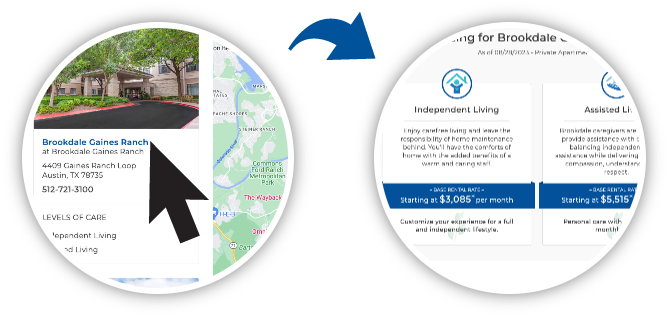- Home
- Brookdale Life
- Brookdale Blogs
- Alzheimer’s Research Trends and Updates
Alzheimer's & Dementia, Brookdale Vision and Growth
October 27, 2020
Alzheimer’s Research Trends and Updates
While those statistics are daunting, there is plenty of reason for hope. Experts are optimistic about the prospects for a real breakthrough in the treatment and prevention of Alzheimer’s. And as experts dig deeper into the underlying causes of dementia, they are identifying clearer connections between lifestyle and behavior modification that significantly reduce the risk of being impacted by dementia.
We talked to Dr. Carl V. Hill, the vice president of Scientific Engagement for the Alzheimer’s Association. Dr. Hill leads outreach to a network of staff, volunteers and donors at more than 75 Association chapters. His mission is to raise awareness for the Association’s role in accelerating Alzheimer’s research and to share scientific updates. Dr. Hill earned his Ph.D. from the University of Michigan School of Public Health and holds a master’s degree in public health from Morehouse School of Medicine where he received its Distinguished Alumnus Award in 2019.
Dr. Hill explains why he’s optimistic about the research aimed at treating the underlying causes of Alzheimer’s and identifying lifestyle modifications to lower the risk of Alzheimer’s. Here are some of the most promising developments:
Potential New Therapies - Currently, there are no therapies that can cure Alzheimer’s, but some drugs are available to temporarily improve symptoms. Dr. Hill says researchers are making great progress in developing new and better therapies. Perhaps the most exciting development is the announcement from the FDA that it will place the drug Aducanumab under priority review. Aducanumab is an anti-amyloid antibody for treatment of dementia and mild cognitive impairment (MCI) due to Alzheimer’s disease. This is the first review process for an Alzheimer’s preventative treatment in 10 years. Dr. Hill says this is exciting news because Aducanumab treats the underlying cause of Alzheimer’s and provides the potential for therapies that can eventually prevent the onset of the disease.
Gene Therapy – Researchers have identified the ApoE – e4 gene as the strongest known predictor for Alzheimer’s for White, European descended populations. But they are also learning that this gene is less of an indicator for some Latin American populations. Most importantly, as researchers learn about the genetic indicators for Alzheimer’s, they are better able to identify risk factors for various populations. These insights are helping scientists customize more effective prevention strategies to specific ethnic and racial groups.
Lifestyle Interventions to Reduce Risk – Recent studies are making even stronger connections between chronic health conditions such as obesity, diabetes and depression and the increased risk of Alzheimer’s and other forms of dementia. Building on those findings, researchers are now identifying specific behavioral modifications (diet, quitting smoking, exercise, etc.) that can significantly reduce the risk of Alzheimer’s. The Sprint Mind-Body Study looked at 9,000 people over the age of 50 and the impact of standard versus intensive blood pressure intervention on the risk of dementia. The study found the intensive therapies to lower blood pressure led to a 17% reduced risk of Mild Cognitive Impairment (MCI) and 19% reduced risk for dementia. Dr. Hill says these studies should provide motivation for all of us as we age that if we take steps to improve our overall heath, we reduce our risk of Alzheimer’s.
So, there are some some rays of sunshine poking through the clouds as we look at the trends surrounding Alzheimer’s and other forms of dementia. Dr. Hill says consider this: if we can develop a treatment by 2025 that delays the onset of Alzheimer’s by just five years, 5.7 million people who are expected to develop Alzheimer’s by 2050 would not be impacted by the disease. That would have a huge impact on the trajectory of Alzheimer’s and finally start moving the numbers in a more hopeful direction.
The above content is shared for educational purposes only. You must consult your doctor before acting on any content on this website, especially if you have a medical condition. The content is not intended to be a substitute for professional medical advice, diagnosis, or treatment. Never disregard professional medical advice or delay in seeking it because of something you have read on our site.
Categories
- Alzheimer's & Dementia
- Caregiver's Corner
- COVID-19
- Health, Safety and Wellness
- Financial Well-Being
- Passion & Purpose
- The Journey to Senior Living
- Trending Now
- Socialization & Relationships
- Brookdale Solutions
- Brookdale Vision and Growth
Archives
View All
- October 2025
- September 2025
- August 2025
- July 2025
- June 2025
- May 2025
- April 2025
- March 2025
- February 2025
- January 2025
- December 2024
- November 2024
X
Let us help find the right community for you!
Complete the form and a Senior Living Advisor will be in touch!
Inside Brookdale Communities
See what’s happening on our community Instagram pages
Brookdale has communities near you!



